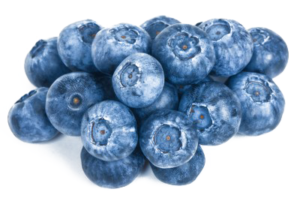 For years studies have suggested that eating blueberries and other berries is good for our health (here, here, and here). Now another study suggests that eating wild blueberries benefits children's thinking, specifically attention and "executive function" (mental processes which lets people plan, organize, and complete tasks). What was nice in this study was that it was "double-blind"- which meant that biases couldn't influence the results.
For years studies have suggested that eating blueberries and other berries is good for our health (here, here, and here). Now another study suggests that eating wild blueberries benefits children's thinking, specifically attention and "executive function" (mental processes which lets people plan, organize, and complete tasks). What was nice in this study was that it was "double-blind"- which meant that biases couldn't influence the results.
Flavonoids are a diverse group of phytonutrients (plant chemicals) found in almost all fruits and vegetables. They are powerful antioxidants with anti-inflammatory and immune system benefits. And yes, other studies have also found various benefits to mental processes with an increase of flavonoids in the diet - in both children and adults.
What foods contain flavonoids? There are 6 main classes of flavonoids, and each is found in different foods: - Anthocyanidins – found in red, purple,and blue berries, red wine, and red and purple grapes. - Flavonols - found in onions, leeks, broccoli, Brussels sprouts, kale, tea, berries, beans, and apples. - Flavones - found in parsley, celery, and hot peppers. - Isoflavones - found in soybeans, soy products, and legumes. - Flavanones - found in citrus fruit and tomatoes. - Flavanols - found in tea, red wine, grapes, apples, fava beans, and cocoa. From Medical Xpress:
Primary school children could show better attention by consuming flavonoid-rich blueberries, following a study conducted by the University of Reading. In a paper published in Food & Function, a group of 7-10 year olds who consumed a drink containing wild blueberries or a matched placebo and were tested on their speed and accuracy in completing an executive task function on a computer.The double blind trial found that the children who consumed the flavonoid-rich blueberry drink had 9% quicker reaction times on the test without any sacrifice of accuracy. In particular, the effect was more noticeable as the tests got harder.
Previous [Univ. of] Reading research has shown that consuming wild blueberries can improve mood in children and young people, simple memory recall in primary school children, and that other flavonoid rich drinks such as orange juice, can also improve memory and concentration.
Wild blueberries are grown and harvested in North America, and are smaller than regular blueberries, and are higher in flavonoids compared to regular varieties. The double-blind trial used a flavonoid-rich wild blueberry drink, with a matched placebo contained 8.9 g of fructose, 7.99 g of glucose and 4 mg of vitamin C matching the levels of nutrients found in the blueberry drink. [Original study.]
